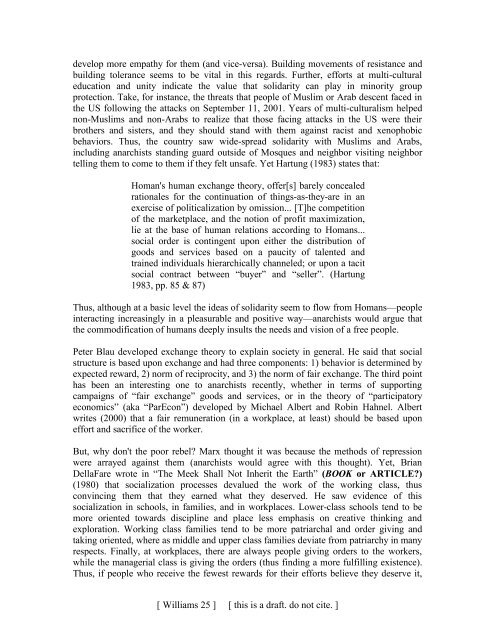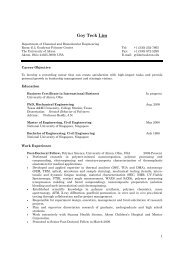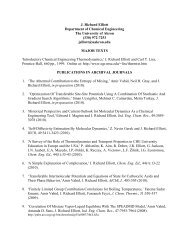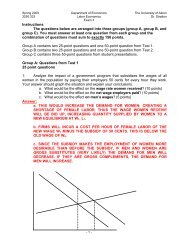Sociology of the Anarchists - Gozips.uakron.edu - The University of ...
Sociology of the Anarchists - Gozips.uakron.edu - The University of ...
Sociology of the Anarchists - Gozips.uakron.edu - The University of ...
Create successful ePaper yourself
Turn your PDF publications into a flip-book with our unique Google optimized e-Paper software.
develop more empathy for <strong>the</strong>m (and vice-versa). Building movements <strong>of</strong> resistance and<br />
building tolerance seems to be vital in this regards. Fur<strong>the</strong>r, efforts at multi-cultural<br />
<strong>edu</strong>cation and unity indicate <strong>the</strong> value that solidarity can play in minority group<br />
protection. Take, for instance, <strong>the</strong> threats that people <strong>of</strong> Muslim or Arab descent faced in<br />
<strong>the</strong> US following <strong>the</strong> attacks on September 11, 2001. Years <strong>of</strong> multi-culturalism helped<br />
non-Muslims and non-Arabs to realize that those facing attacks in <strong>the</strong> US were <strong>the</strong>ir<br />
bro<strong>the</strong>rs and sisters, and <strong>the</strong>y should stand with <strong>the</strong>m against racist and xenophobic<br />
behaviors. Thus, <strong>the</strong> country saw wide-spread solidarity with Muslims and Arabs,<br />
including anarchists standing guard outside <strong>of</strong> Mosques and neighbor visiting neighbor<br />
telling <strong>the</strong>m to come to <strong>the</strong>m if <strong>the</strong>y felt unsafe. Yet Hartung (1983) states that:<br />
Homan's human exchange <strong>the</strong>ory, <strong>of</strong>fer[s] barely concealed<br />
rationales for <strong>the</strong> continuation <strong>of</strong> things-as-<strong>the</strong>y-are in an<br />
exercise <strong>of</strong> politicalization by omission... [T]he competition<br />
<strong>of</strong> <strong>the</strong> marketplace, and <strong>the</strong> notion <strong>of</strong> pr<strong>of</strong>it maximization,<br />
lie at <strong>the</strong> base <strong>of</strong> human relations according to Homans...<br />
social order is contingent upon ei<strong>the</strong>r <strong>the</strong> distribution <strong>of</strong><br />
goods and services based on a paucity <strong>of</strong> talented and<br />
trained individuals hierarchically channeled; or upon a tacit<br />
social contract between “buyer” and “seller”. (Hartung<br />
1983, pp. 85 & 87)<br />
Thus, although at a basic level <strong>the</strong> ideas <strong>of</strong> solidarity seem to flow from Homans—people<br />
interacting increasingly in a pleasurable and positive way—anarchists would argue that<br />
<strong>the</strong> commodification <strong>of</strong> humans deeply insults <strong>the</strong> needs and vision <strong>of</strong> a free people.<br />
Peter Blau developed exchange <strong>the</strong>ory to explain society in general. He said that social<br />
structure is based upon exchange and had three components: 1) behavior is determined by<br />
expected reward, 2) norm <strong>of</strong> reciprocity, and 3) <strong>the</strong> norm <strong>of</strong> fair exchange. <strong>The</strong> third point<br />
has been an interesting one to anarchists recently, whe<strong>the</strong>r in terms <strong>of</strong> supporting<br />
campaigns <strong>of</strong> “fair exchange” goods and services, or in <strong>the</strong> <strong>the</strong>ory <strong>of</strong> “participatory<br />
economics” (aka “ParEcon”) developed by Michael Albert and Robin Hahnel. Albert<br />
writes (2000) that a fair remuneration (in a workplace, at least) should be based upon<br />
effort and sacrifice <strong>of</strong> <strong>the</strong> worker.<br />
But, why don't <strong>the</strong> poor rebel? Marx thought it was because <strong>the</strong> methods <strong>of</strong> repression<br />
were arrayed against <strong>the</strong>m (anarchists would agree with this thought). Yet, Brian<br />
DellaFare wrote in “<strong>The</strong> Meek Shall Not Inherit <strong>the</strong> Earth” (BOOK or ARTICLE?)<br />
(1980) that socialization processes devalued <strong>the</strong> work <strong>of</strong> <strong>the</strong> working class, thus<br />
convincing <strong>the</strong>m that <strong>the</strong>y earned what <strong>the</strong>y deserved. He saw evidence <strong>of</strong> this<br />
socialization in schools, in families, and in workplaces. Lower-class schools tend to be<br />
more oriented towards discipline and place less emphasis on creative thinking and<br />
exploration. Working class families tend to be more patriarchal and order giving and<br />
taking oriented, where as middle and upper class families deviate from patriarchy in many<br />
respects. Finally, at workplaces, <strong>the</strong>re are always people giving orders to <strong>the</strong> workers,<br />
while <strong>the</strong> managerial class is giving <strong>the</strong> orders (thus finding a more fulfilling existence).<br />
Thus, if people who receive <strong>the</strong> fewest rewards for <strong>the</strong>ir efforts believe <strong>the</strong>y deserve it,<br />
[ Williams 25 ] [ this is a draft. do not cite. ]






